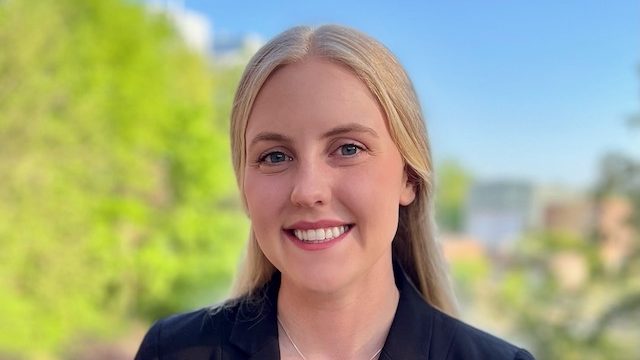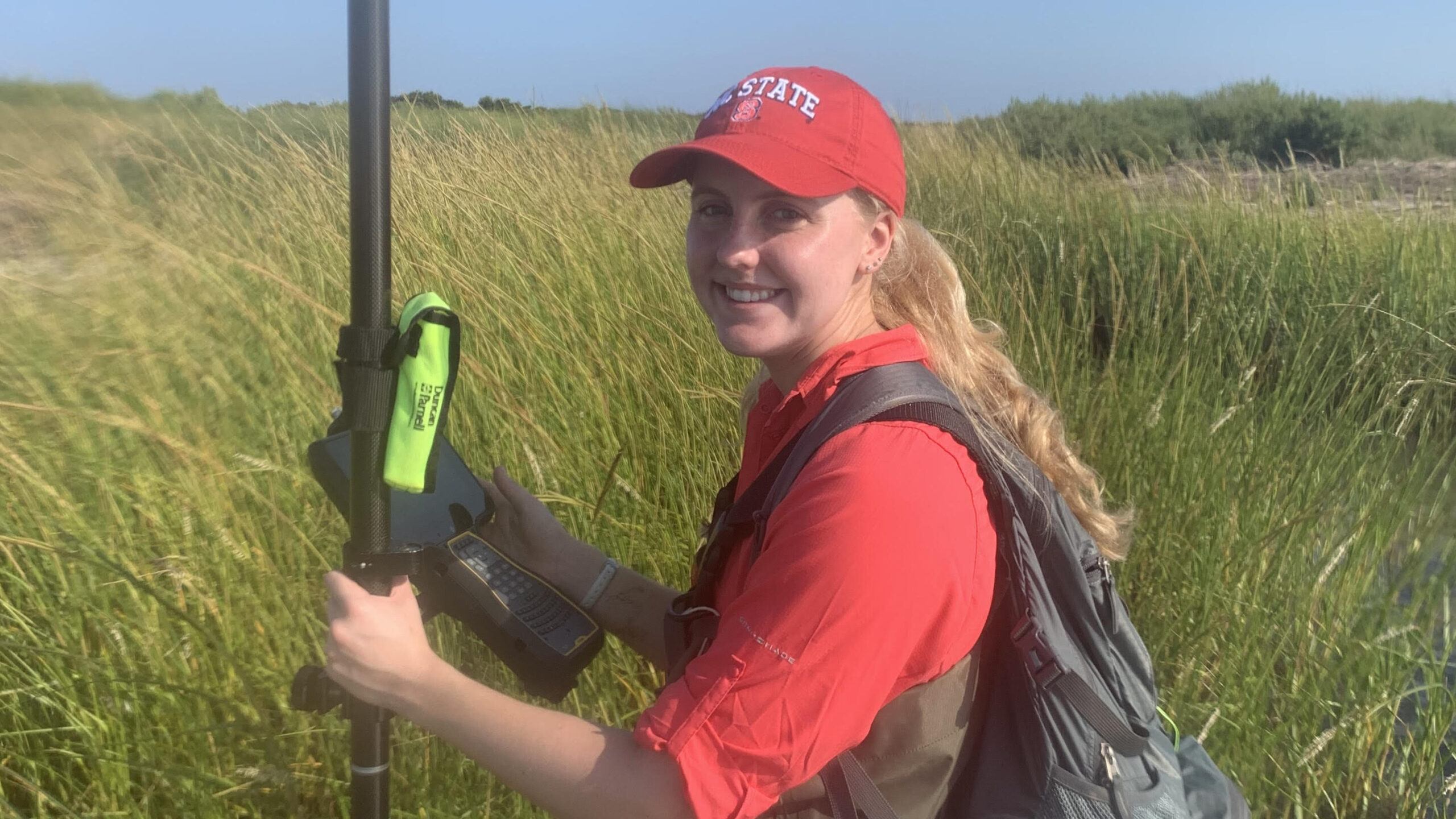Researcher Spotlight – Sophia Rosenberg

2022-23 Global Change Fellow
MS Student, Department of Civil, Construction, and Environmental Engineering
Advisor: Dr. Elizabeth Sciaudone
Every year the Southeast Climate Adaptation Science Center funds a multi-disciplinary cohort of Global Change Fellows representing colleges across NC State University. Here are some highlights about 2022-23 Fellow, Sophia Rosenberg and the applied research she’s conducting.
About You
What do you study?
I study coastal engineering, which is a specialized area of civil engineering. At NC State, I study coastal hydrodynamics (think waves, tides, and currents), beach morphology change due to storms (i.e., dune erosion, overwash, breaching), and coastal highway vulnerability on barrier islands.
What (or who) influenced you to go into this field of study?
I was inspired to go into this profession after interning for a summer as an ecologist at an environmental firm that specializes in wetland and stream restoration. Though I majored in Environmental Science in college, I found I really enjoyed the technical aspects of engineering when applied to ecological restoration. From there I decided to pursue a degree in engineering at NC State, specializing in coastal engineering. I chose coastal engineering specifically because I wanted to work on the coast, helping restore eroded shorelines using nature-based methods of design.
What do you think is the most pressing issue related to global change?
I believe the most pressing issue related to global climate change is rising sea levels. About 40% of the world’s population lives within 60 miles of the coast. As sea levels rise into established communities, we will see increases in saltwater intrusion, shoreline erosion, and hurricane damage, as well as traffic disruption and increased risk to critical infrastructure from flooding. Rising sea levels mean not only a loss of land, but loss of culture, and in some places a loss of way of life. Tuvalu is a primary example, a small country in Oceania where rising sea levels threaten to encompass their entire island in the future. Every coast experiencing sea level rise will eventually have to adapt, or the consequences could be dire.
About Your Research

How can your research be used to inform management decisions?
My research can be used by natural resource managers – those at the Pea Island National Wildlife Refuge as well as other sites considering a similar adaptation strategy – to plan for potential future barrier island morphological changes. This includes decreases in alongshore dune crests, subaerial volume, and land cover changes due to overwash deposition.
How would you describe your research to a 3rd grader?
North Carolina recently built a bridge on an island off its coast in order to protect a critical roadway. Once the bridge is finished, they will no longer manage the dunes in the area where the previous road was located, and the area will be returned to the wildlife refuge on the island. Because the dunes will no longer be managed, we expect storms to more easily overtop the dunes and the area to be highly vulnerable to storms. My research focuses on trying to predict how storms in the near future will affect this island, and how refuge managers may need to respond. To do this I will build a model that can simulate erosion on the beach during storms. I will run hypothetical “future” storms through my model, and it will show how much and where we can expect further erosion and sand deposition due to storms.
How would you describe your research to a 10th grader?
My research focuses on a stretch of barrier island located in Rodanthe, North Carolina, the site of a recent adaptation strategy that involved relocating the road away from the ocean coastline into the sound and ceasing human management of alongshore dunes. This adaptation measure was put into place due to projections of high roadway vulnerability due to further shoreline erosion and rising sea levels. My study’s main goal is to better understand how an adaptation strategy that allows overwash to occur in a previously managed area may alter island morphology in the near-term future due to storms. To do this I prepared a model that is able to simulate beach morphology change due to individual storms. To create hypothetical (synthetic) storms, I extracted storm criteria from historical storms, such as maximum wave height and maximum storm surge elevation, and scaled these values to typical profiles that represent tropical storms. I then ran a set of these hypothetical storms through my model, and analyzed changes to total island subaerial volume and alongshore dune crest height, as well as spatial patterns of overwash in both across and along the barrier island. I also ran my model under a second scenario, one in which the dunes are flattened to mimic possible dune morphology after a couple hurricane seasons. My results will help identify potential land cover and habitat modifications that may occur within the area in the near future. The methodology and overarching trends I present in my research are applicable to other barrier islands that have experienced long-term dune management, and may be helpful for natural resource managers and other stakeholders who consider a similar adaptation approach.
About Your Global Change Fellow Experience
What has been your favorite part of being a SE CASC Global Change Fellow?
My favorite part of being a Global Change Fellow was the week-long field intensive over the summer. I really enjoyed getting to know my GCF peers, hearing from experts, and going on excursions into the field and into the small coastal town nearby.
What advice would you give to a student that is interested in getting involved in your field?
I would say in order to get into coastal engineering you should try to get experience on coastal projects, either while still in undergrad or through a master’s degree. If your school doesn’t offer coastal engineering specific courses, or you don’t have professors that are coastal engineers, try to take courses in coastal sciences in general. A big part of the job is understanding coastal phenomena like waves, tides, storms, and flooding.
What advice would you give to an incoming Global Change Fellow to get the most out of their experience?
My advice would be to take advantage of the networking opportunities that present themselves with visiting speakers and SE CASC coordinators. There are so many people that are more than willing to help you excel in your career, so take advantage of it while you can!
- Categories:
